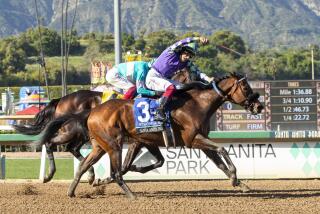Investor Targets Aerospace Conglomerate : R. D. Hubbard, a Risk Taker Used to Winning
- Share via
R. D. Hubbard is a man who likes to take chances on the future.
He did it when he forged two nearly bankrupt companies together to form what is now the nation’s fourth-largest glassmaker, AFG Industries in Irvine. And he’s done it at the race track, where’s he’s built an impressive stable of quarter horse winners.
Now he may be doing it with Lear Siegler, the Santa Monica aerospace conglomerate.
Earlier this week, Lear Siegler said AFG and a Texas oil company had jointly acquired more than 5% of its stock and were seeking a meeting with management. Their intention became more clear Thursday evening when they announced that they are seeking to take over Lear Siegler for $1.5 billion, equal to $85 a share.
Those who know Hubbard, who is called “Dee” by friends and business associates, say the move is entirely consistent with his penchant for bold and decisive action. The move also appears to be consistent with his ability, both in business and as the owner of several prize-winning horses, to spot a bargain and capitalize on its strengths.
“He doesn’t go after anything he doesn’t want,” said Wayne Basler, the president of AFG Industries and Hubbard’s business associate since 1977. “He’s not afraid of taking risks at all.”
Hubbard’s first demonstration of this trait came in 1977, when he quit his job as president of Lear Siegler’s automotive glass-making division to buy Fourco Glass Co., a struggling and nearly bankrupt manufacturer in the depressed Appalachian Mountains of West Virginia that Hubbard had earlier tried to persuade Lear Siegler to buy.
Within six months of buying it, Hubbard had Fourco turning a modest profit. A year later he merged it with another teetering glassmaker to form AFG, a company with annual sales approaching $400 million and an unbroken chain of yearly profits.
“He’s a very savvy, very smart businessman,” said Claire L. Armentrout, an analyst with J. C. Bradford, a brokerage firmin Nashville, Tenn. “AFG is a contender for the title of the best-performing glass company in the country.”
Hubbard has earned high marks for steering AFG away from the cyclical and low-profit auto and home-building markets for glass and toward more lucrative and stable speciality glasses, such as insulated and laminated products.
Through a series of acquisitions, AFG now makes mirrors, glass used in solar energy applications and glass for aquariums, appliances, patio furniture, shower doors, microwave ovens and non-glare picture frames. Today, speciality glasses account for more than 50% of the company’s sales.
Hubbard, who wears a heavy gold bracelet and a large gold necklace with a horseshoe pendant, has had equal success spotting future winners at the track.
According to Brad McKinzie, an editor of Quarter Week magazine in Cypress, Hubbard likes to buy yearling quarter horses at low prices and bet that they will turn into big winners.
“He’s not afraid to take a gamble,” McKinzie said. “He’s not the type of guy who’ll spend $400,000 to $500,000 for a horse. I think he’s thinking, ‘Anybody can buy a horse for $400,000.’ . . . He sells more $500,000 horses than he buys.”
For example, McKinzie said Hubbard bought a filly named Denim and Diamonds in 1978 for $32,000 when she was a one-year-old without knowing for sure whether she would turn into much of a runner. By the time her career was over, the horse had accumulated winnings of more than $600,000.
Sixy Chick, another quarter horse was bought by Hubbard for $17,000 when she was six months old. Her total winnings were $747,000, and Hubbard sold her a few years ago for about $1 million, McKinzie said.
“He’s a winner in everything he does,” said Sandy Farris, whose husband, Don, is Hubbard’s horse trainer. “He’s very competitive. If he’s in it, he’s in it to win.”
Indeed, Hubbard’s need to win and his fierce competitive spirit are frequently mentioned by friends and business associates who have watched his climb.
Born 50 years ago in Smith Center, Kan., Hubbard was the eighth child of Miner and Loese Hubbard, who operated the town’s ice business. Hubbard got his first job from his father, hauling 25- and 50-pound ice blocks.
After high school and a few years as a farm worker, Hubbard, by now a husband and father of two, spent two years at a community college in Kansas. He left to become a $3,200-a-year teacher and basketball coach in Towanda, Kan.
Basketball turned out to be Hubbard’s ticket out of the slow lane. A basketball scholarship lured him back to a four-year college, where he studied business and thrived on the on-court competition. After graduation, he became a $90-a-week salesman for an auto glassmaker in Wichita.
Today, Hubbard has a building named after him at Wichita State University, keeps only Mercedes-Benz cars at his three homes (Newport Beach, Palm Desert and Lexington, Ky.) and enjoys using his cellular phone to make deals from the back seat of his chauffeur-driven limousine.
“No doubt about it. He makes his own luck,” McKinzie said. “If he makes up his mind to do something, he just does it. Most people lose opportunities by sitting and thinking about it. He doesn’t spend a lot of time worrying. He just does it.”
More to Read
Inside the business of entertainment
The Wide Shot brings you news, analysis and insights on everything from streaming wars to production — and what it all means for the future.
You may occasionally receive promotional content from the Los Angeles Times.










